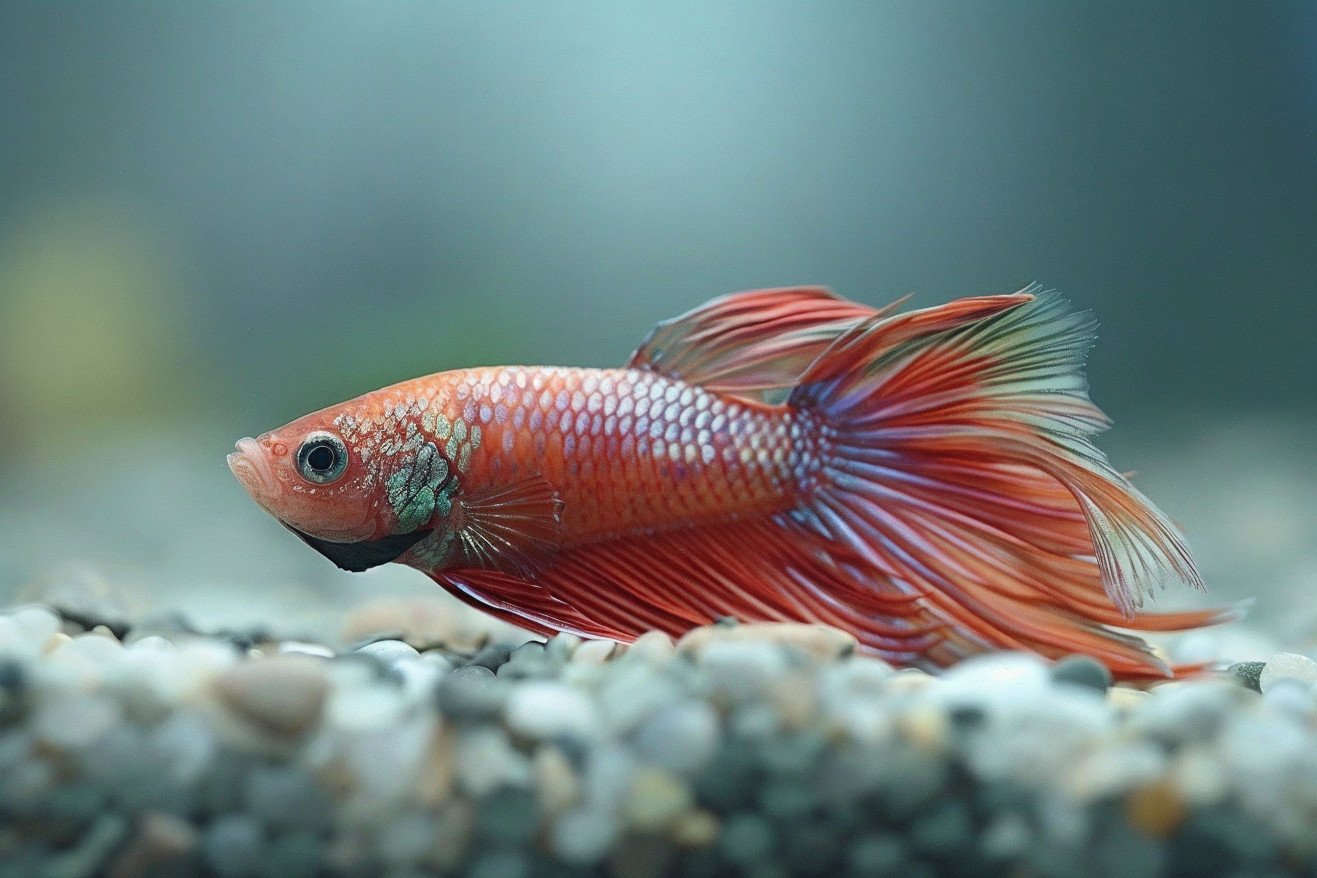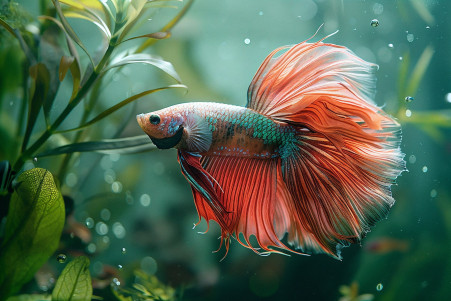How to Tell If Your Betta Fish Is Dying: Symptoms and What to Do
5 March 2024 • Updated 4 March 2024

Betta fish often display a number of specific behaviors as they get closer to death. Some of the most common signs that your betta fish is dying include lethargy, loss of appetite, loss of color, and labored breathing.
Your fish may also lie at the bottom of the tank or gasp at the surface. Knowing what to look for can help you determine when your betta fish needs help or when it’s getting close to the end.
This article will review research from the fields of ethology, veterinary sciences, and aquaculture management to help you better understand betta fish behavior as they near death. We will also look at research on the effects of environmental factors, stress, and aging to give you a complete picture of what to expect.
This information will help you make sure that you’re providing the best care for your betta fish and may even help you ensure that they live longer and healthier lives.
How can you tell if your betta fish is dying?
How to Tell: Betta Fish and End-of-Life Signs
Betta fish have an average lifespan of two to five years, and as they get older, there are a few signs that can indicate that they are nearing the end of their life.
According to Betta Buddy, some of the most common signs of a betta fish getting old are a lack of energy, a lack of appetite, and a loss of color. All of these signs point to a larger issue, such as a disease or a stress response.
Meanwhile, an article by LoveToKnow Pets explains that other signs, like a swollen belly or gasping at the surface, can point to water quality issues or more serious health problems like dropsy, which is associated with organ failure or bacterial infections.
The environment that the betta fish is in can also play a role in how these signs present themselves. Fishkeeping Advice explains that water quality is one of the most important factors in a betta fish’s health and that poor water quality can exacerbate or even cause health problems, which can lead to symptoms like stress, loss of energy, and rapid breathing.
This is why it’s important for betta fish owners to keep an eye on their water quality and their betta fish’s behavior and appearance to make sure that they catch these signs.
If any of these signs are noticed, it’s important for betta fish owners to take their fish to a vet to make sure that they can tell the difference between a condition that can be treated and one that is a natural part of the aging process.
In some cases, LoveToKnow Pets explains that it may be best to euthanize a betta fish that is suffering from a condition that can’t be treated. This will help to make sure that the fish doesn’t suffer and that it can die with dignity.
In addition to making sure that the betta fish is as comfortable as possible, this will also help to make sure that the betta fish is as comfortable as possible.
Environmental Enrichment for Betta Fish
The most recent scientific research has shown that environmental enrichment plays a critical role in the welfare and behavior of betta fish. A study published in PMC describes environmental enrichment as the improvement of an animal’s environment to increase its adaptability and welfare in captivity. In the case of betta fish, this means adding physical structures, different substrates, and auditory components that are similar to their natural environment.
Research has shown that these changes can lead to a reduction in stress and anxiety-like behaviors, which are shown by an increase in exploratory behaviors in fish that are in enriched environments.
A study by Jürgen Ingemar Johnsson also showed that environmental enrichment can impact aggression, energy use, wounding, and disease in fish that are kept in captivity. These studies show that it’s important to have environments that are carefully designed to meet the needs of betta fish at different stages of their lives.
It’s also important to standardize these enriched environments so that betta fish are being kept in the best possible conditions and so that the results of behavioral studies are more reliable.
The evidence that is building up shows that enriched environments could significantly improve the lives of these popular pets and possibly even increase their lifespans. However, more research is needed to make sure that EE is being used in the best way for betta fish so that their lives are both full and healthy.
Stress in Betta Fish: The Silent Killer
As in humans, stress can have a major impact on the health and behavior of betta fish. According to Aquarium Life, stress is a biological reaction to negative stimuli, and it can cause a number of concerning symptoms in bettas, including clamped fins, dull coloration, and a lack of energy.
A study in PMC even found that chronic stress can significantly suppress the immune system of a betta fish, leaving it more vulnerable to illnesses and speeding up the aging process.
From poor water quality and overstocking to an improper diet and lack of stimulation, there are many potential stressors for bettas. Japanese Fighting Fish explains that if a betta is stressed for a long period of time, it can lead to both physical symptoms and behavioral changes, including the fish hiding more and swimming erratically.
It’s important to reduce stress in order to keep bettas healthy. Hepper recommends that fish owners regularly check water quality, make sure their tanks are stimulating and have plenty of hiding places, and feed them a varied diet.
By doing so, fish owners can help ensure that their bettas stay healthy and that stress doesn’t impact their behavior as they age. Understanding and addressing stress in betta fish is important for making sure that these aquatic animals live long, happy, and healthy lives.
Understanding the Signs: Physiological Changes That Happen in Aging Betta Fish
As betta fish age, they experience a variety of physiological changes that can be indicative of their age and how much time they have left. While there is limited research on these changes, a seminal study from 1974, published in PubMed, looked at aging changes in the Siamese fighting fish.
While this study focused on the testes, it provides a general framework for how physiological functions break down over time, leading to a decline in overall health and wellness.
These changes are often accompanied by changes in behavior. For example, a betta fish that is nearing the end of its life may lose some of its luster, with its colors becoming less vibrant, and it may also become less active. These changes in behavior can be indicative of other health problems, such as organ failure or systemic infections, which are often accompanied by a lack of energy or appetite in betta fish.
Knowing what to look for in terms of physiological changes can help ensure that you can provide the best care possible.
For example, some of these changes can be helped by ensuring that your betta fish is in the best possible water quality and is being fed the best possible diet.
While you can’t reverse the aging process, knowing what to look for in terms of physiological changes can help you make the best decisions about your betta fish’s care and treatment, which can ultimately help ensure that your betta fish has the best quality of life.
Water Quality and Betta Fish Health
The health of betta fish is directly impacted by the water quality of their environment. According to Betta Fish Center, bettas are tropical fish and prefer water temperatures between 76 and 82 degrees Fahrenheit. They also prefer a slightly acidic pH level of 6.5.
Stress, disease, and end-of-life behaviors are common in bettas when they are exposed to poor water quality, which includes incorrect temperature, high chlorine, and pH levels that are too high or too low. UW Photo Ring says that clean tap water that has been treated to remove chlorine and heavy metals is essential to betta fish health.
It is also recommended to use water conditioners and test kits to make sure that the water is just right.
It’s important to stay on top of water quality to make sure that it stays at healthy levels. Veterinary Medicine at Illinois recommends using low-flow filtration to keep the tank clean without damaging the betta fish’s delicate fins. It also says that it’s important to use treated tap water or bottled water because distilled water doesn’t contain the minerals that betta fish need.
By keeping an eye on water quality, betta fish owners can help prevent stress-related behaviors and premature death in their pets, ensuring that they live a long, full life.
Conclusion: Betta Fish Care and the Fragility of Life
In looking back on our exploration of betta fish behaviors and care, we also find the important warning signs that a betta is nearing the end of its natural life. Betta Buddy and LoveToKnow Pets list symptoms ranging from lethargy to loss of color that go beyond just getting older and let owners know that something needs to be done to help their fish.
We’ve also seen that environmental enrichment, stress management, water quality, and understanding the aging process are all essential to helping bettas live longer, healthier lives.
We’ve also seen that environmental enrichment and water quality can impact the vibrancy of life and the quality of a betta’s final days. Owners who understand the signs of stress and aging listed by Fishkeeping Advice can make changes to their betta’s environment and care that may help them live longer.
As people who care for these beautiful fish, we’ve seen that it’s important to remember the honor and the duty of providing a safe, healthy environment for them. We hope that the information we’ve shared here will help and encourage betta lovers to give their fish the best life possible.


